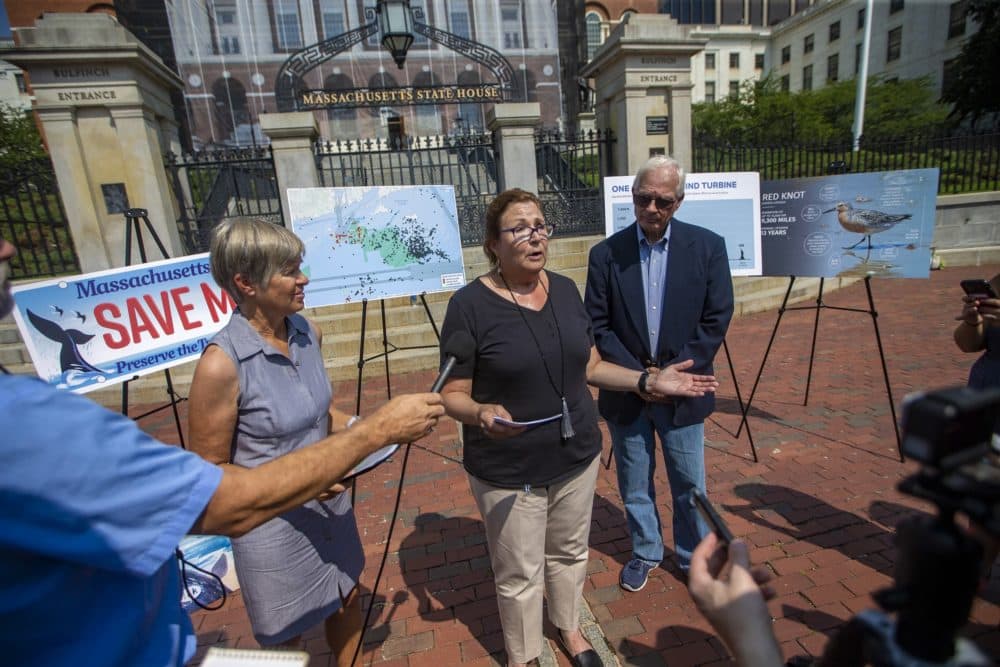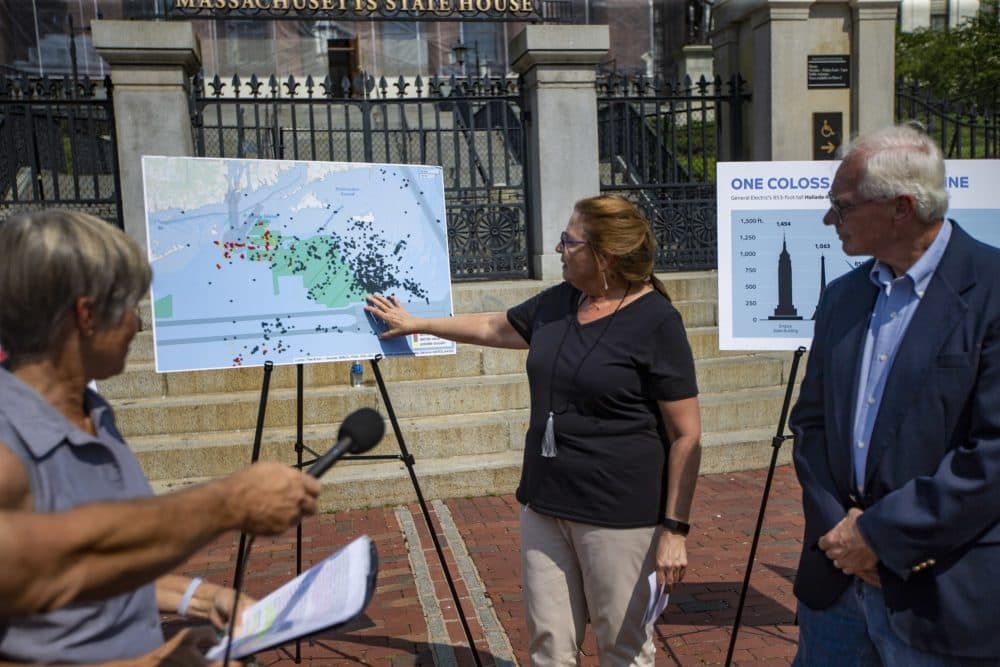Advertisement
In Federal Lawsuit, Nantucket Residents Say Offshore Wind Will Harm Endangered Whales

A group of Nantucket residents filed a federal lawsuit Wednesday to block the construction of dozens of wind turbines off the coast of Massachusetts.
Nantucket Residents Against Turbines — or ACK RAT — says Vineyard Wind’s proposed project 14 miles (22 kilometers) south of the island poses a risk to the endangered North Atlantic right whale.
Mary Chalke, an island resident and member of the group, said the lawsuit against the U.S. Bureau of Ocean Energy Management and other federal agencies isn't just about Vineyard Wind, but the consequences of greenlighting other turbine projects also in the pipeline.
“We all want renewable energy,” she said after the group filed the suit in Boston federal court. “This represents the transformation and industrialization of a pristine natural environment."
BOEM and other federal agencies have determined that the wind project will have minimal impact on the species. In an environmental document released last year, the agencies concluded that noise from piling driving activities during the construction phase of the project would cause, at most, temporary stress and behavioral disturbances for about 20 whales. Noise associated with any other part of the project was determined to be "insignificant."
Vineyard Wind's construction plan, which was given final approval earlier this year, specifies that the company will only do this loud construction work at times of the year when the whales are unlikely to be in the area.
Still, Vallorie Oliver, an island resident and co-plaintiff in the lawsuit, argues federal officials haven't provided adequate research to back up their claims.
“We're simply asking for real science-based answers to the impact on our natural environment,” she said, speaking with other group members in front of the Massachusetts Statehouse.
In a statement, Francis Pullaro, the Executive Director of RENEW Northeast — a local environmental organization — called the federal review process for the project "thorough."
“The rigorous environmental review and permitting process has fully addressed the issues raised and the only effect of this frivolous lawsuit can be to delay delivery of clean energy that benefits the ocean environment and the residents of Massachusetts," he wrote.
Advertisement
He added that the fact that the plaintiffs are OK with having wind farms as long as they are farther from the coast shows that their real motivation is "aesthetics."

The group, whose name references the three-letter airport code for Nantucket Memorial Airport, argues the project is proposed for a major area for foraging and nursing for right whales.
“The construction of these turbines is set to take place in a nexus of activity of the North Atlantic right whale, a critically endangered baleen whale with a population of fewer than 400 specimens remaining in the world,” the organization said in a statement on its Facebook page.
Both BOEM and Vineyard Wind declined to comment on the lawsuit.
David T. Stevenson, executive director of the conservative Delaware-based group Caesar Rodney Institute, was also at the press conference. Stevenson, who served on the Trump administration's EPA transition team, said he's been fighting offshore wind projects off the Delaware coast for years and that there are several issues with projects like Vineyard Wind.
There are the whales, of course, he said. But there are also visual issues, issues for commercial fishermen and safety concerns.
"Visual is always the one that gets the attention because [people say], 'Oh, it's just a bunch of rich people that don't want to look at this," he said, adding that he worries the federal government isn't taking these issues seriously or doing the methodical review they deserve.
These projects "are all coming, bing, bing, bing. There's not going to be any, 'We will build one and learn. It's, 'we're going to build, build, build,' " he said.
Stevenson also used this occasion to announce a new multi-state coalition committed to fighting offshore wind projects, the American Coalition for Ocean Protection (ACOP). According to its website, the group comprises coastal residents and thinks tanks, though it does not list its members.
The group's goal is to "create a permanent offshore wind exclusion zone to 33 miles off the entire eastern seaboard of the United States," according to the website.
In the two weeks since it launched, Stevenson said ACOP has raised $75,000 toward its $500,000 goal. The money, he said, will be used to help support lawsuits like the one ACK RAT filed today.
Approved in May, the 800-megawatt Vineyard Wind project would be the first utility-scale wind power development in federal waters. The nearly $3 billion project is expected to create enough electricity to power 400,000 Massachusetts homes annually.
There are several other large wind projects in the federal cue behind Vineyard Wind, and the Biden administration has vowed to move forward quickly on their approval as part of his goal to get 30 GW of offshore wind power in the ocean by 2030.
Despite the enthusiasm, U.S. offshore wind development is still far behind progress made in Europe. A small wind farm operates near Block Island in waters controlled by the state of Rhode Island, and another small wind farm operates off the coast of Virginia.
The Nantucket group is the latest opposition effort to crop up in response to the large scale wind projects.
Fishermen who ply the lucrative waters from New Bedford, Massachusetts, to Montauk, New York, have also objected to the potential impacts to their livelihood.
Bob Vanasse, who heads the fishing advocacy group Saving Seafood, says wind farms proposed in what's known in the industry as the New York bight could impact scalloping, a trade that makes New Bedford the highest valued port in the country.
“There are a number of groups in various fisheries who have raised concerns about the insufficiency of the planning and review effort,” he said. “This group is far from alone in that.”
Vineyard Wind also comes years after the infamous Cape Wind project, which failed after bitter litigation from another group consisting of Nantucket property owners as well as Native American tribes and environmental groups.
Supporters of Vineyard Wind have said the newer project is better sited than Cape Wind, which was proposed closer to shore.
With reporting by The Associated Press' Philip Marcelo
